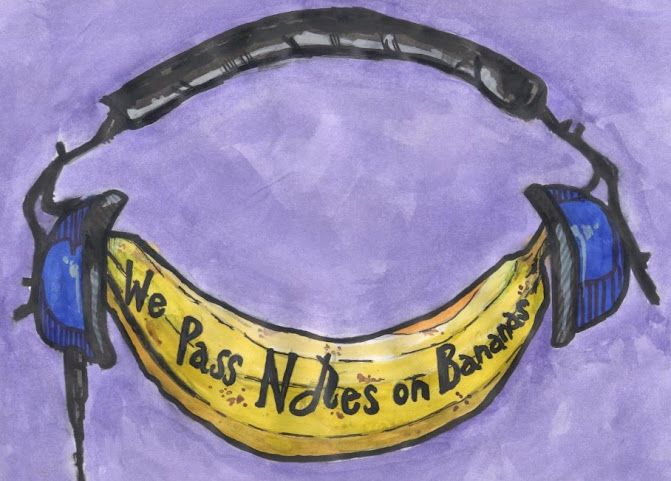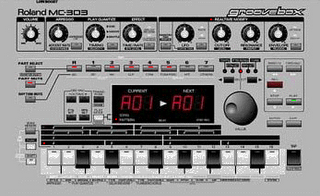 Today I Started Celebrating Again (alt) / Will Oldham
Today I Started Celebrating Again (alt) / Will Oldham
Dude's cover of RK's "Ignition" is atrocious. And dude blew in the DJ tent at Intonation last summer, where he demonstrated nothing except the high irony quotient of his iPod library. But none of that means Oldham can't get down.
"Today I Started Celebrating Again" is the single moment of brilliance on an otherwise mediocre 1999 compilation that highlights the tricky magic of The Groovebox. A reference to Merle Haggard, gentle grooving pops, and "I am drinking again" are more than enough to start this party. Barring Jim Guthrie's "Who Needs What," I can't think of a song so quiet that makes me want to dance so bad. Think overweight and white; think a Bud in each hand; think John Travolta just barely moving on the dancefloor at Jack Rabbit Slim's. Think DANCING in the mirror.
I'm on vacation for a week. This is the celebration.
April 28, 2006
At Home with the Groovebox
Posted by
time warner cable
0
comments
![]()
April 23, 2006
Dating Advice from the Smarter Sex
The Worrying Way / The Fabulettes [dead link]
Tip #103: Date a philanderer, and all the worrying you do will subtract pounds, especially from your hips. (Thanks to Naomi.)
Dicks Don't Grow On Trees / Robyn Archer [new link]
Tip #009: If you're attracted to penis, you should date a male animal. (Thanks to AQ.)
This second tune comes from the incredible 365 Days Project at Ubuweb and is jam-packed with astounding facts...
Fact: I know that you could root, root, root with a well-made Japanese substitute / But I realize you'd rather have the real thing / Woo! Give me that ping!
Fact: There ain't no cock trees, prick trees, or dick trees.
Fact: You'd be lucky if you get one dried-up old scrotum.
Posted by
time warner cable
2
comments
![]()
April 21, 2006
No Junk No Soul?
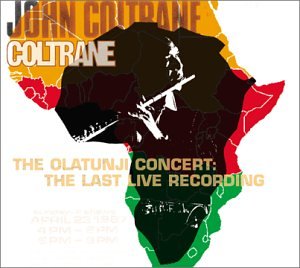 MP3 My Favorite Things (live) / John Coltrane [31.7 MB]
MP3 My Favorite Things (live) / John Coltrane [31.7 MB]
Yesterday I went to a traditional shaman ceremony in northern Seoul. We saw the 75-year-old North Korean woman who started the shaman resurgence in Korea in the 1970s. We saw a possessed shaman in drag dance on a giant knife blade. We saw a woman who'd hired shamans for a private ritual get pelted with rice and beans. And we saw voodoo-like dolls being made to scare evil spirits away from the real bodies of children.
Those were the highlights. But the one thing you don't really notice until it's gone, the one thing that truly matters, is the music. Whenever the music stops, the sacred quality of the rituals dissipates almost entirely. Without the incessant rhythms and the simple melodies, the magic just isn't there. My favorite instrument was the "taepyongso," which sounds like a stunted oboe crossed with a recorder. That is, like the alto sax in free jazz. It's riffs sound like Ornette Coleman or Albert Ayler even when they're entirely harmonious.
This version of "My Favorite Things" is from Coltrane's last live recording, from one of the two shows he played in Olatunji, Africa, in 1967. There's no alto here, but the song still reminds me of the taepyongso, if only because it's as primal as can be. In "Brian the Bachelor," a season four episode of Family Guy, Brian and Brooke bond over "early Coltrane, before he got clean." Brian comments, yeah, yeah, "no junk no soul." But that is bullshit. Listen to this song and tell me Coltrane has no soul at the end of his career in '67. Sanders and Coltrane both sound as if they're punishing their own enormous spirits—trapped deep inside their instruments—until they scream cries and are freed. Only for the briefest moments does any of this maniacal 34-minute trip resemble "My Favorite Things," and the only one who needs junk to take it is the listener. This is not for the faint of heart. This is for someone with a desert or two and not much else.
John Coltrane, soprano, tenor saxophone; Pharoah Sanders, tenor saxophone; Alice Coltrane, piano; Jimmy Garrison, bass; Rashied Ali, drums; Algie Dewitt, bata drum; probably Jumma Santos, percussion
Also: Check out Armrest, a music blog that thoughtfully analyzes the way specific contemporary songs borrow from their ancestors.
Posted by
time warner cable
2
comments
![]()
April 20, 2006
The Stereotypical Furniture Mover
Thin Blue Flame / Josh Ritter [2006]
I am seated at the DWM table with George Washington, Babe Ruth, Dean Moriarty, and Chris Farley. Only one of us is unreal; the rest are dead. There are pitchers of cold beer, shots of whiskey, and tobacco. Washington remarks that he got plastered only two days earlier.
Our hands are dealt by someone famous whom I don't recognize. He might be Greek or a writer. Either way, I see nothing good all night except once, full of spades. We drink and lose our money to the Babe. He reaches over to sweep in the pot, and his gut creases against the tabletop. Farley does a great impression.
I've never heard so much bullshit spoke in one night. Dean stands up occasionally, as if to leave, only to remember through the haze of alcohol that his car is in the shop. He smacks the dealer on the back each time, returns to his seat, and asks for a set of ladies. More material for Farley, for everyone.
By the time we finish our third bottle of Jack the laughing begins to slow. Soon we stop talking entirely. The music picks up, and the rest of the people in the bar are, for the first time, really there. The radio hangs above the mirror and the bottles. It should be "Desolation Row" but it isn't. We look over and notice a machine making special air next to the speakers. Air that makes it so you don't need tragedy for meaning.
This is heaven. They have that here.
Posted by
time warner cable
0
comments
![]()
April 18, 2006
They removed the front of my eyeballs and stitched them to my upper back
Debaser (Pixies cover) / Feed
Covering a song like "Debaser" is a waste. Bands should cover "Emulsified" and "Why I Hated August 93." Bands should cover "Let's Talk About Spaceships" and "Federal Dust." Bands should borrow greatness only when they're playing live. Bands should leave those versions unreleased.
Bands should mutilate greatness so far it's turned inside-out, returning to somewhere neither of them have ever been before. Bands should undergo surgery for the good of the nation. (Bands should glue their brains to the ceilings of their skulls.) Bands should try to marry other bands by screaming "I love you I love you I love you," in other words.
Bands should do this, precisely. This is a terrible beauty. The first two minutes are a declaration of love. At 2:01, it sounds like "Karate Feelings" will start playing. Then two minutes more: Frank Black on bottom?
Posted by
time warner cable
0
comments
![]()
April 15, 2006
Don't Talk to Me About Gene Hackman
Top 10 Songs Titles Since 1998
10. They Are Night Zombies!! They Are Neighbors!! They Have Come Back from the Dead!! Ahhhhh! (Sufjan Stevens, 2005)
9. Get the Fuck Off My Cloud (Blood on the Wall, 2005)
8. Vikings Invade the Mediterranean But Don't Leave (Prefuse 73, 2002)
7. I'm Getting Back Into Getting Back Into You (Silver Jews, 2005)
6. If You Shoot the Head You Kill the Ghoul (Jeffrey Lewis, 2003)
5. Judy Is a Dick Slap (Belle & Sebastian, 2000)
4. Me and Jesus the Pimp in a '79 Granada Last Night (The Coup, 1998)
3. Halfway to a Threeway (Jim O'Rourke, 2000)
2. Fuck Yeah, That Wide (Local H, 2003)
1. Don't Talk to Me About Gene Hackman (Robyn Hitchcock, 1999)
Not a very diverse list, I realize. Whatever, maybe lame white boys are genetically predisposed toward being more interested in the names of their songs than the songs themselves. The winner is one of the two hidden tracks (has anyone done a full album of those yet?) from Jewels for Sophia. Except for The Coup track, it's also the best piece of music on the list. The audience laughter is annoying, and Hackman doesn't deserve to be a source of mockery (Robyn: You seen The Conversation??), but I like it when he calls a coke a "bottle of pop."
Sufjan Runner-Up: Year of the Asthmatic Cat
Posted by
time warner cable
1 comments
![]()
April 14, 2006
Mr Robot Yr On Fire Mr
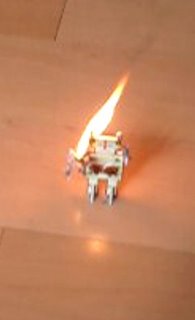 La Nuit / Robots in Disguise [2005]
La Nuit / Robots in Disguise [2005]
It's kinda weird that when someone tells you disguised mod-squad femme-bots are coming to take over the universe, you probably think, "Yeah, like that's never been done before." Whatever, if Robots in Disguise can make more dance songs like this, they can be forgiven. Did they get their name from Tranformers? From that Fridge song? By combining The Robot Ate Me with "There's No Invisible Diguise"? It don't matter. Listening to "La Nuit" makes you feel like you just woke up in Gunther's Tra La La video, except all those hot chicks are French instead of German. Not the leader, of course—she's a British spy.
Thanks to Maggie.
Posted by
time warner cable
1 comments
![]()
April 13, 2006
I've Misplaced My Pants
 Hi / The Underwear Band
Hi / The Underwear Band
안녕 / 우리는 속옷도 생기고
Mexico Line High-Speed Train / TUB
멕시코행 고속열차 / 우리는 속옷도 생기고
Along with Bulssajo, these pantsless Korean post-rockers opened for Mono on Saturday, April 8th, in Seoul. The show was good times. The three guitarists remained seated, two facing the amps and away from the audience. The bassist is a girl; she stood in the middle doing her thing, as if the three guitar players were in competition for her hand. They wooed away, each in search of the largest dowry.
But the drummer and his mallets actually stole the show. When their go-to song, "Hi" (or "Annyeong," for AD fans), peaks and the spotlight turns upward on the audience, something is really happening. The sound and the light crest, eventually, but you are left with a feeling, and staring at the drummer. Try 6:32 in the studio version.
TUB disbanding on May 2nd, but they have a show this Saturday in Seoul with the psych-rock band, The Mustangs. One can only hope that, like the five elements that form Captain Planet, these two will unite to form The Musty Stanky Underwear Band.
Posted by
time warner cable
0
comments
![]()
April 11, 2006
Easy Questions for Easy Girls
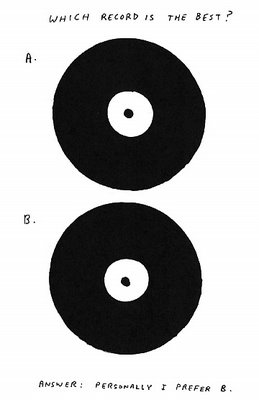
The Devil Is Beating His Wife / Pedro the Lion
Sure, the b-side isn't always better, but we do always want it to be. And if there's anything better than a good b-side, it's a good demo. Promise, potential, and obscurity are more beloved than all but the greatest of polished artifacts. These are things Shrigley (above) knows.
The song is a Pedro the Lion demo from 2005. DB#3 takes a southern expression (devil's beatin' his wife = it's raining while the sun is shining) and transforms it into one of his mini-sagas. The king of hell, maybe, is reimagined as a drunkard who hits on check-out girls and is... "Trying to focus his high hopes / On a vagina or two." Unpolished, but classy. Satan's all class.
Then again, "God isn't listening" either.
Posted by
time warner cable
0
comments
![]()
April 8, 2006
You Know I Hate Stupid Phones
 Hate songs are tough to write. They have the virtue of rarely being cheesy, but they just as rarely manage to capture hate in a way that allows them to endure as the most enduring love songs have. Here are seven that try.
Hate songs are tough to write. They have the virtue of rarely being cheesy, but they just as rarely manage to capture hate in a way that allows them to endure as the most enduring love songs have. Here are seven that try.
Hate Song / Daniel Johnston
The directness of hate makes for great gags and great names. "You Know I Hate Stupid Phones" (Liars). "If You Hate Your Friends, You're Not Alone" (Pretty Girls Make Graves). "Whisper in My Ear and Tell Me You Hate Me" (Prefuse 73). "Prom Night at Hater High" (The Long Winters). "I Hate My Generation" (Sloan). "I Hate Your Fucking Guts" (The Queers). "I Hate Hate" (Cornelius). Viva Hate (Morrissey). I Hate You When You're Pregnant. These work because hate is funniest when it's at its most viciously blatant. See the David Shrigley drawing. Hear the Daniel Johnston song describe a lonely ex-lover who kills herself. It's funny in a pathetic, cruel way: "You'll be all alone... no one to talk you out of it... no one will be there to find you dead... 'cause you'll be all alone." Funny, but not his most rewarding song.
Miss Me / The Wrens
Hate makes for great sparks and flashes, as it makes for humor. But hate songs almost never last. NO ACCIDENT, perhaps, that the word "hate" is contained in the word "whatever": it's hard to care about a hate song for an extended period of time. This is strange because bad memories, those of death and of betrayal, tend to last much longer than good ones. Maybe these experiences don't translate into song as hate. Hate is instantaneous, not meant to last. Perhaps it can't, really. Of course, that's where rock and punk should be perfect: immediacy and directness. The hate itself might disappear, but with a push of a button a good song should be able to recall it. "Miss Me" (a simplistic but louder early version of the better-known "Boys, You Won't Remember") is my favorite Wrens song. One of the strangely few hate songs with enough energy to pump you up and down at the same time, every time.
No Children / The Mountain Goats
Yet "Miss Me" still lacks the depth of a good love song. It's fine for transforming anger into mobile energy, for a pissed-off ride through the suburbs; but to get at something more we have to pull out the big guns. Guns that will last, that will not be eased from a loosening grip. We know where to look for the knockout:
In my life, I hope I lie,
and tell everyone you were a good wife.
And I hope you die,
I hope we both die.
Johnny B. Good-->Road Runner / The Sex Pistols
"No Children" is an ending, but it's not the ending. The first three songs were about hating someone: a person, a girl, someone you used to love or still do to no avail. More or less successful attempts at building on Leopard-Skin Pill-Box Hate. But hate comes in another form as well, a more general one. You can hate a group of people, a scene, music itself, and so on. As it gets more general, spiraling out ad infinitum, hate also becomes more complex. Less focused and less sharp, but more deadly. The sarcasm doesn't emerge quite so readily, and thus is transformed into something even more bitter. The Jesus & Mary Chain song "I Hate Rock 'n Roll" is a good example; this Sex Pistols covers-medley is a better one.
Old New York / Silver Jews
At its most general, hate consumes everything. This nihilistic version of hate can be baffling. Why bother? What is really being said? "No Children" is a classic, but it's completely decipherable. "Old New York," an old Jews tune from 1993's The Silver Jews and Nico, in contrast, is totally bewildering. It devours a scene, certainly, and an entire city. But Berman and Malkmus seem so revolted with the people, objects, and activities they mention, so revolted by their own wryness, that absolutely everything seems to burn, slowly.
Trickle Down / Mercury Rev
This burning can smolder, or it can provide space for something new. The Jews song just dies; the bar is bombed and nothing grows there ever again. "Trickle Down" is also from 1993, and the vocals sound eerily similar. (Is there something universal in hate? An atom of anti-love?) Hates on Reagan, ironically on minorities, and definitely on life. But it's even more lost and confused than "Old New York," even more bizarrely diffuse, especially for being so ostensibly topical. Yet, unlike the other hate songs, from out of this confusion it moves (slowly) forward both musically and linguistically: "You think / You think / You think too much / I think / I think you think too much." This song succeeds in being both hateful and great. Unfortunately, the attempted rebirth is only partial. No one involved with Mercury Rev would produce anything as great as Boces ever again. On "Trickle Down" you get a sense of the core of hate and the interpersonal conflicts that led the band to dissolve around itself; that led it to emerge as a new-agey Flaming Lips spawn with its center, its heart of both light and darkness—David Baker—completely excised. And as any good dualist will point out, hate it or love it, without the hate there's no real love either.
Revved Up (ft Nina Gordon of Veruca Salt) / Triple Fast Action
In the interest of not ending with pseudo-philosphical bullshitting, here's a full-circle palette-cleanser of sorts. Rev-erence for general hate, like "Trickle Down," but with the straightforwardness of Johnston's "Hate Song." The high-pitched "hate you... hate you... hate you... hate you..." at the end is one of my favorite moments of mid-'90s alternative rock, that acme of music history.
Posted by
time warner cable
1 comments
![]()
April 5, 2006
Where was it one first heard of the truth? Té te'.
 It must be called "Intelligence" if people stop when they realize they are not able to become what they are wishing to be. / te' [2006]
It must be called "Intelligence" if people stop when they realize they are not able to become what they are wishing to be. / te' [2006]
Break the "heart" to what is actually being told instead of asking who said that. / te' [2006]
The name: Way cooler the way it's written on their website, on their tour poster to the left, and in the articles written about them than the way it's written on the cover of their "deview" LP: te' is infinitely better than té. The diacritic mark, whether accent or apostrophe, is definitely supposed to be falling off the edge of the "e" into oblivion. Or truth. Or something. Either way, it recalls "teh," which can't be a bad thing.
The album title: Take a breath... If that is what is being thought, liberated sound talks the depths of "musical" world.
The song titles: Take that, Sufjan Stevens.
The sound: Japanese post-rock that kicks eth shit out of Mono's latest release. On the U.S. version, which just came out in March, the album opens with the strongest track. Originally released as a single in 2004, "It must be called 'Intelligence'..." quickly reached #1 on the Disk Union charts in Japan.
Listening to this song makes me think of The Shins, but only because it sounds absolutely nothing like them. The one time I saw The Shins play, they ran through maybe 15 songs before finally reaching full steam. And then het concert was over. They'd finally reached the point where the experience was something worthwhile, and they just stopped. This is not a lack-of-badassness-critique. Not even Natalie Portman expects Te Shins to be badass. But there's no reason they shouldn't play with some heat and maybe even, god forbid, rock out or something.
In contrast, "It must be called 'Intelligence'..." starts off as if te' has been playing for three hours already and is finally reaching a true climax. And that's just the first fifteen seconds. Admittedly, the entire album doesn't sustain that type of energy and is replete with the expected quiet build-ups and lulls; still, hte double lead guitars and pounding drums are never just going through the motions. Even for non-post-rock fans, te''s (yes!) young blood noticeably invigorates the standard tropes of the genre.
The closing track: A bonus only available on the U.S. version, "Break the 'heart'..." adds a number of sounds (including steel guitar?), to nice effect and gives a glimpse of the band moving forward. Maybe the apostrophe will be one space over next time around.
Related: If you haven't, read the article in which Simon Reynolds coined the term "post-rock." It discusses a variety of tensions (studio vs. performance, democracy vs. elitism, brain vs. heart, Eno vs. rednecks) in unexpected Reynoldsian ways. The the.
Posted by
time warner cable
1 comments
![]()
April 3, 2006
Jeff Tweedy Live at Mandel Hall, Chicago: 2006-02-25
Download the full concert: All 21 Tracks [93 MB]
Download a song: Remember the Mountain Bed
Above is a zip file of the entire Jeff Tweedy show I mentioned last week. Below is the setlist and links to more live stuff. This one took place in Mandel Hall, which Jeffs called "like the best sounding room I've ever been in." And it does sound good, as if it happened outside on a day when the entire planet was indoors. In a good way.

Jeff Tweedy live links
-at The Abbey, Chicago, 2002-06-10 (full concert)
-at The Vic, Chicago, 2003-01 (three highlights)
-at Mandel Hall, Chicago, 2006-02-25 (full concert)
This Setlist
Jeff Tweedy
2006-02-25
Mandel Hall, University of Chicago
Chicago, IL
1. Sunken Treasure
2. (Was I) In Your Dreams
3. Remember The Mountain Bed
4. Muzzle Of Bees
5. One By One
6. Bob Dylan's 49th Beard
7. I'm Always In Love
8. Spiders (Kidsmoke)
9. The Ruling Class
10. Theologians
11. A Shot In The Arm
Encore 1:
12. I Am Trying To Break Your Heart
13. Forget The Flowers
14. Please Tell My Brother
15. I'm The Man Who Loves You
Encore 2:
16. In A Future Age (with Nels on dobro)
17. Dash 7 (with Nels on dobro)
18. When The Roses Bloom Again (with Nels on lap steel)
19. Airline To Heaven (with Nels on lap steel)
20. Walk On (with Nels on dobro)
21. Acuff-Rose (performed at edge of stage, without PA system)
Posted by
time warner cable
4
comments
![]()
April 2, 2006
More Intensity
Stara Planina / Ruins [1998]
The song title is Bulgarian and means "Old Mountain," referring to the Balkan range. The insane pace, bass, and drums seem to foreshadow vocals from a hyper 12-year-old girl, but instead we get Tatsuya Yoshida straining to make his voice as deep as the sea. The Ruins have trekked from Japan to perform a ceremony.
Posted by
time warner cable
0
comments
![]()
April 1, 2006
Dust is the Missing Variable
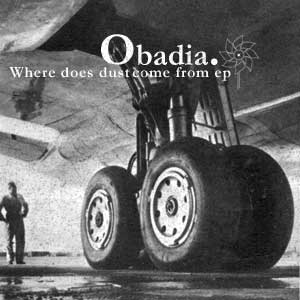 Some Hot Lazy Day / Obadia [2005]
Some Hot Lazy Day / Obadia [2005]
I have no recollection of obtaining this song. If I were ever to pull a Rob Fleming/Rob Gordon and organize my music autobiographically, this would go in the unknown section at the back.
I was going to write "this would go in the unknown section at the back, alongside [clever band X] and [clever band Y]," but it's surprisingly difficult to think of a band or an album that you don't associate with some memory: a person, a room, a show, a meal, a holiday, a record store, a magazine, an advertisement... something. If you don't believe how hard it is to find an indecipherable, just glance through your own music in search of one. Lame or significant, something personal is associated with almost every song. Almost. There are always a few that manage to elude the memory.
Of course, the stuff that is lumped together at the back is usually the junk that you don't really care for. The Aristotle story is an exception. The librarian at Alexandria placed Aristotle's books on a shelf, with one coming at the end after the collection entitled Physics. The librarian had trouble understanding what this last book meant, so he (or she) decided to name it Metaphysics or "After Physics." It's probably a mistake to compare iTunes libraries to collections of ancient Greek texts, but the songs at the back, the autobiographical unknowns, do tend to be some of the most mind-blowing exceptions.
Yet, as much as it is meta-anything, "Some Hot Lazy Day" is also proto-something. Organic experimentalism. Electronic naturalism. Folktronica. Whatever you call it, it sounds like an earlier version. And it is. Recorded between 1998 and 2003, Obadia's free-to-download Where Does Dust Come From, with its hanging preposition, is both a question and an answer, before and after. It's free from associations and free to make new ones, both beyond the natural world and the source of it: both skin and fabric.
Posted by
time warner cable
1 comments
![]()
